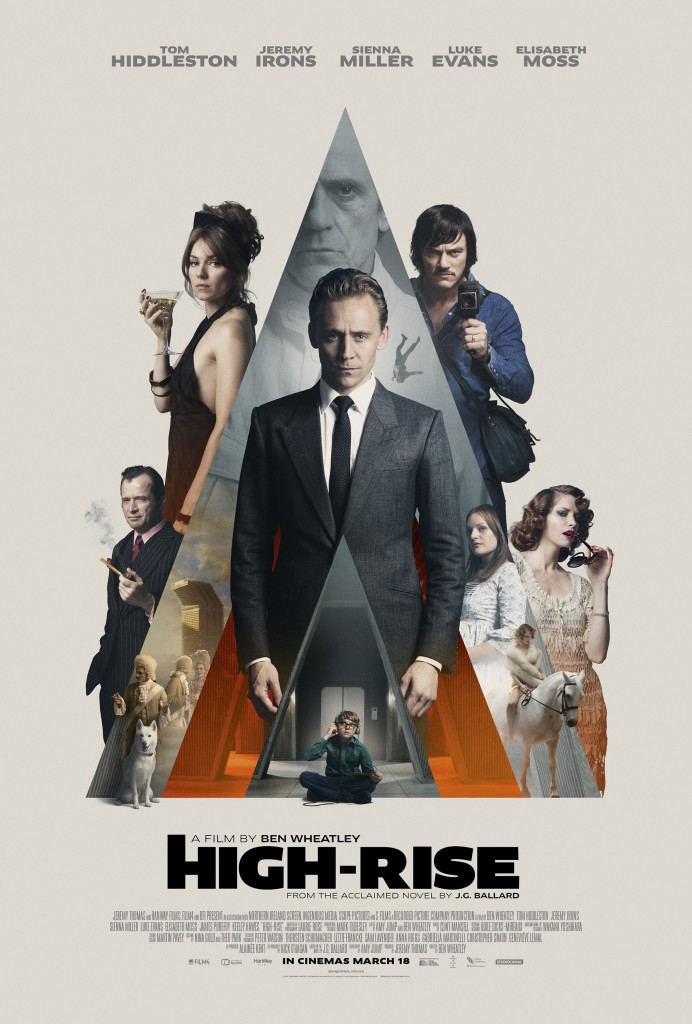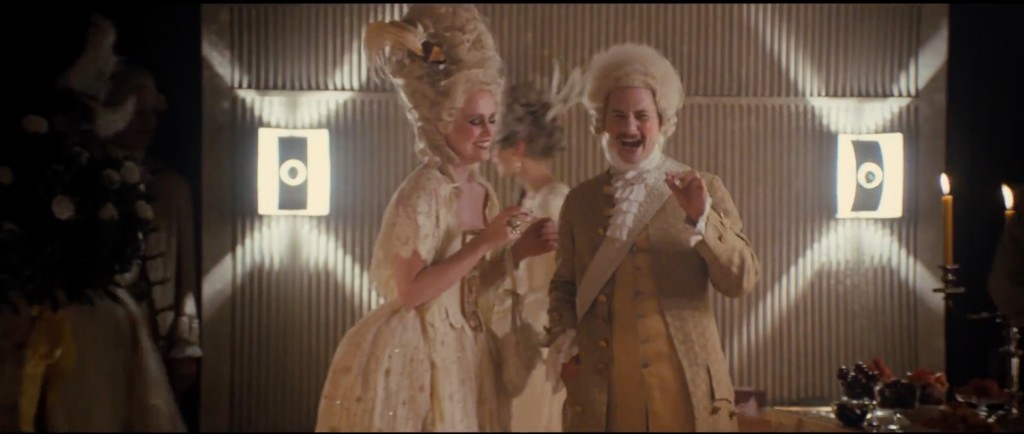Genre: Drama
Premise: In a high-rise building, set in a dystopian future, the lower poor residents begin to rise up against the higher rich residents.
About: Wasn’t the writer of Carol complaining recently that it took 15 years to get Carol made? Well I got news for you, Carol Writer, producer Jeremy Thomas has been trying to get this movie made for 40 years!!! And he finally did it, when the UK’s hottest new director, Ben Wheatley, sought out the rights to the novel and learned Thomas had them. Wheatley snatched up another hot British property in actor, Tom Hiddleston, and finally, High-Rise would be made. Wheatley writes all his scripts with his wife, Amy Jump.
Writers: Ben Wheatley and Amy Jump (based on the novel by J.G. Ballard)
Details: 2 hour running time
I’m going to forewarn you here. I will piss some people off with this review. I am going to be giving some unpopular opinions on beloved directors. I know Mondays are already tough. So if you want to avoid some vitriolic anger, I’m giving you the opportunity to put the computer down. Just walk away, man. Walk away.
Still here? Okay, I warned you!
I’ve been waiting desperately for this film. I thought it looked like one of those unexpected breakout hits that was going to launch everybody involved into the stratosphere. So I was shocked to see it pop up on Itunes this Friday. I mean, I was happily shocked. But I was worried. This was supposed to be Ben Wheatley’s big arrival. He was working with, arguably, the hottest actor in Hollywood in Tom Hiddleston. And he was adapting a famous novel with some pretty lofty production value. A digital release implied – at least to me – that something may have gone wrong.
And that’s too bad. Because I see Ben Wheatley as, potentially, one of the most important directors working. This guy has one of those filmmaking eyes that comes along once every couple of decades. I mean go watch the trailer for this film and tell me you’re not moved by this man’s talent.
However, Wheatley is in danger of becoming one of those directors who never goes beyond indie-cool status because he doesn’t understand the value of screenwriting, or, more specifically, a coherent narrative. He’s inspired by the cinematic inventiveness of men like Quentin Tarantino and Paul Thomas Anderson, believing their vision, their voice, and their filmmaking bravado are enough. But what he doesn’t realize is that the reason Tarantino is the best stylistic “I do things my own way” filmmaker around is because he DOES put so much effort into the screenplay and because he DOES understand storytelling.
On the flip side, the visually gifted Paul Thomas Anderson, who never really understood writing beyond how it propelled his actors’ performances as well as the soul of the film, now finds himself struggling to grasp why his latest two incarnations were so reluctantly received. I’ll tell you why. Because there was no narrative, nothing dramatically to keep us invested. And when you don’t have Daniel-Day Lewis to pick up the slack, when all that’s left is an incoherent narrative – guess what? You no longer have anything of substance. You have a bunch of individual scenes thrown at an editor with the directive, “Figure this out.”
And I’d push beyond that. Visionary directors who don’t know what drama is on the page – Sofia Coppola, Gasper Noe, David Lynch (yes, I said it) – eventually run out of gas, whereas visual filmmakers who understand that writing is a craft that requires just as much attention as filmmaking – they give us the best of both worlds. Guys like Martin Scorsese, Ridley Scott, David Fincher.
As Ben Wheatley stands at the precipice of what could be an amazing career, he has to decide which one of these entities he wants to be. Because these are the exact problems I recognized in his script, Freak Shift – he writes in ideas, in visuals, in how a scene is going to play. He doesn’t write in a way where he’s narratively connecting the dots – where each scene propels the script forward.
And that’s reflected everywhere in High-Rise. Have you ever watched something half-heartedly while you surfed the internet? About 40 minutes in, you see the characters in a cave or on a plane and you go, “How the hell did we get here??” The thing is, you’re the one to blame in that scenario, because you’re the one who wasn’t paying attention. High-Rise creates that same effect even though you’re 100% focused. Scenes seem to come and go without warning. Characters seem to pop up with a disassociativeness that’s typically reserved for mental patients.
At one point, we’re in this party with Tom Hiddleston’s character, everybody dressed in 17th century garb, with wigs and pirate shirts galore, and you literally have no idea why you’re there or what the scene is about. And this is exactly what I mean. The scene LOOKED amazing. It’s the kind of imagery you can throw in the middle of a trailer and the potential audience goes, “Wow, that looks great!” But it’s empty nonsense unless there’s a purpose for it come movie-time.
I tell this to a lot of writers. If you’re going to write a party scene, we need to know a) what the main character wants out of it. And b) what the stakes are (so the scene feels important). For example, I’ve seen lots of party scenes where the hero’s goal is to approach somebody important in the party who they’d otherwise never be able to talk to. That character will then be important to what our hero has to do next in the plot, which is where the stakes kick in. There doesn’t seem to be any knowledge of that going on here. The primary directive is always, “What will look neat?” and while that can carry music videos and even feature films for 20 minutes or so, sooner or later the audience starts asking, “Why am I here?”
I mean this whole movie is about the deterioration of a high-rise as the poor at the bottom rise up and clash with the rich at the top, yet there’s no single moment where you can identify where this takeover was initiated. Like everything in the film, it just sort of happens.
Oh man, I’m so disappointed by this. But at least it serves as a cautionary tale. You can only cover up so much of a bad script with filmmaking. You have to get the script right first.
[ ] What the hell did I just watch?
[x] wasn’t for me
[ ] worth the rental
[ ] impressive
[ ] genius
What I learned: One of the key mistakes that inexperienced writers make, and that was made here, is not building the story. Newbie writers set up their story, usually with a competent first act, and then take this attitude of, “Let’s see where this goes.” As a result, the story starts to feel that way – unconfident. You can almost see the fingers on the keyboard desperately trying to come up with a flashy scene because the last three scenes have gone nowhere. That’s not how you write a good screenplay. A good screenplay is paced, and the second act is about BUILD. It’s about slowly presenting bigger and bigger obstacles for your main character to overcome on the way to their goal. I can always tell a rushed script or an inexperienced writer because they write all these scenes into one 15 page block right after the first act, then have no idea where to go next. This results in 50 pages of treadmill storytelling until they can finally get to their climax. This is how High-Rise felt to me and this is what happens when you only study the filmmaking side of the business and not the screenwriting side.



